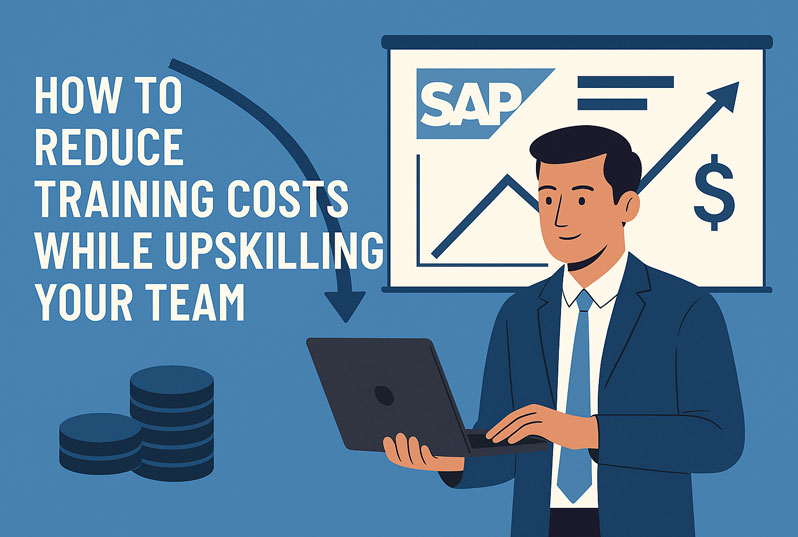Your Short Guide to SAP ABAP
by Michael Management
 SAP ABAP is a complex, changing coding system that empowers developers to customize their SAP software to do nearly anything that a developer can imagine — or their boss can request!
SAP ABAP is a complex, changing coding system that empowers developers to customize their SAP software to do nearly anything that a developer can imagine — or their boss can request!
But SAP ABAP isn’t necessarily easy to learn, especially if you’re new to development as a career choice. ABAP is both a standalone coding language and an amalgamation of other coding languages that serve different purposes on SAP.
With this in mind, ABAP is understandably more challenging to learn and master than more common coding languages like, say, HTML or Java.
Still, ABAP is functionally the best fit for SAP in general because it’s so broad and encompassing. If SAP ran on any other coding language, it simply wouldn’t be able to do what it needed to do for companies around the world.
Plus, because ABAP entails so many other languages, it can use the best strengths of multiple languages instead of being limited by the weaknesses of a single language.
So what are you supposed to do if SAP ABAP isn’t coming naturally to you?
In this blog, you’ll learn more about SAP ABAP, what it includes, why it’s important, and even resources to help your learning.
What Is SAP ABAP?
As we said above, ABAP is the coding language that powers the SAP software. But ABAP is more than a single language.
In fact, ABAP itself includes elements of Java, C, C++, and Python, all of which have their different strengths. Altogether, this makes ABAP an object-oriented, structured language that excels at everything from parsing data to powering essential functionality within a company.
ABAP has a long and storied history with SAP, having first appeared in 1983 with a very different set of operations.
But today, ABAP is a significant, sophisticated, and powerful coding language that expands a developer’s toolset dramatically over previous iterations.
With that in mind, what can you expect to learn when you embark on mastering SAP ABAP?
1. SAP ABAP Best Practices
Like any structured system, there are certain ways you can make the most of SAP ABAP. These are called best practices, and they form the foundational understanding of how you can best use SAP ABAP to the advantage of an employer either now or in the future.
The best practices themselves are varied in terms of what you need to know and how you can best utilize them. Regardless, they’re intended to make your life easier while giving you the background knowledge you need to help a company succeed from a developer standpoint.
This includes understanding SAP ABAP frameworks and how they function, among other details. Best practices also entail understanding the differences and advantages of using ABAP classic and ABAP object, which are two programming methods that you can use to achieve different results.
2. Debugging
Because custom code leaves the door open for almost any eventuality, it’s essential that an SAP programmer understands how to debug ABAP code properly.
ABAP, in a nutshell, allows a developer to create entirely custom functions within the confines of an SAP interface, meaning it’s capable of doing things that the architects of the coding language may not even realize.
This is becoming somewhat common with enterprise-level software — see Salesforce and HubSpot — which has led to an increasing need for structured, organized debugging processes.
Debugging is the method of identifying and fixing problems in code so that a custom function can properly perform. Perhaps the most common form of debugging is known as the “rubber duck method,” in which a developer talks out loud to a rubber duck at their desk about every single line of code.
However, this is a fairly antiquated method of debugging, and SAP ABAP is capable of a much more structured and methodical debugging process.
This is considered an essential part of your education in SAP ABAP. Debugging is a slightly different experience from coding from scratch, and it requires an equally thorough understanding to do well.
This is especially important if you ever find yourself debugging someone else’s code and vise versa.
3. Keyboard Shortcuts
The third area of SAP ABAP expertise has very little to do with the functionality of ABAP itself.
Instead, it’s focused on using ABAP efficiently as a developer.
Because ABAP is so broad, it comes with numerous built-in macros and shortcuts that allow a developer to account for complex functionalities with minimal keystrokes.
Knowing, practicing, and mastering those keystrokes can make all the difference between a project that takes all day and one that takes a few hours.
In other words, the keyboard shortcuts in SAP ABAP empower you to work at your best in what is already a complex ecosystem. When you can do that, everything becomes much easier.
Are You Ready to Master SAP ABAP?
This blog post only accounts for three elements of the SAP ABAP learning experience, and there are many more.
So if you find yourself having a challenging time with SAP ABAP, this post is just the tip of the iceberg.
You may find it helpful to download our free ABAP cheat sheet which is chock full of helpful ABAP information.
This cheat sheet covers some of the information we discussed above, and it takes a deep dive into other areas that we didn’t discuss. It also shows you a shortlist of the actual keyboard shortcuts (and other functions) that are helpful to know at a glance, ensuring you can perform your best work in a fraction of the time it may take someone else.
by Michael Management
More Blogs by Michael Management

How to Build an SAP Training Program for Your Company
Building an SAP training program is not just about onboarding user...

How to Reduce Training Costs While Upskilling Your...
Implementing SAP is a major investment for any organization but wi...

Related Blogs

Your Guide to the SAP Materials Management Module
The SAP materials management (MM) module is one of the largest and mos...

Your Guide to SAP Finance (FI): The Most Important SAP...
The SAP financial accounting module (SAP FI) is the #1 most important ...

Four Steps to Effective SAP Data Cleansing
It's an inevitable problem. Over time, data gets messy. This includes the...
.png)

